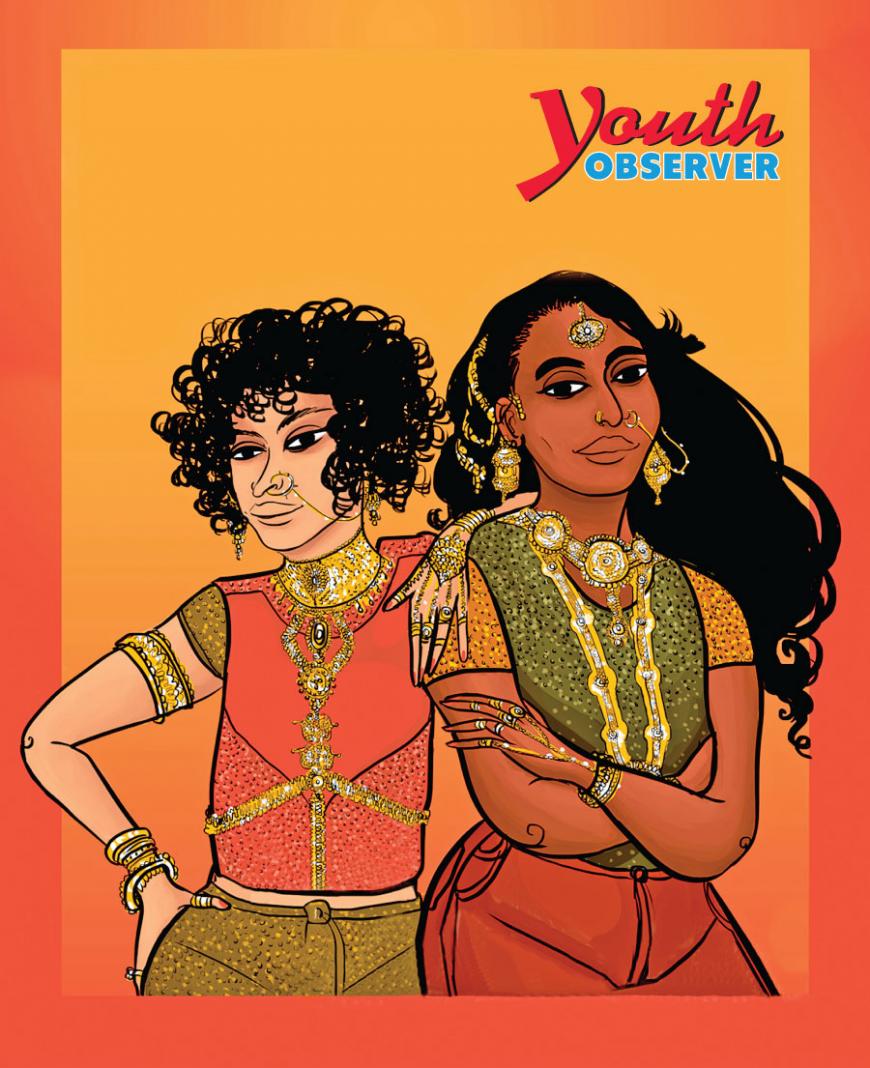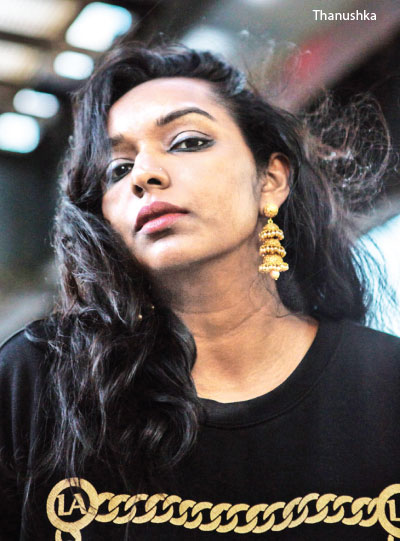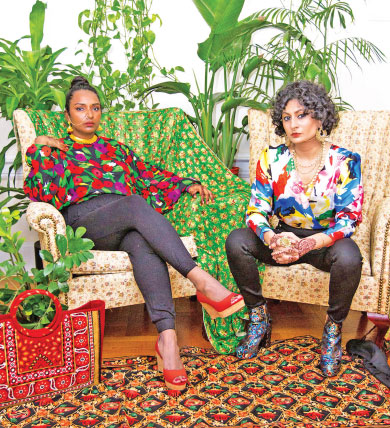
Art and migration, sounds and stories, hopes and fear, hostilities and need to become part of a community-
This is what Thanushka Yakupitiyage, artist, activist and DJ, living in New York City, tries to express through her latest audiovisual installation which was held at The Shed recently. Called MigrantScape - the urgency of seeing the so called others life struggles.
The closing performance shouted to decolonise The Shed.
A performance beyond borders, made together with the Sri Lankan dancer and harpist Natalia Natania, also known as Elsz – (who’s currently doing a Crowd funding to create her two part album called Blue Scar ) -which is a body of work dedicated to victims and survivors of gender violence.
A stunning last day
Thanushka at the Dj set. Elsz now dancing at the notes. Parts of the documentary are incorporated and mixed to the music played at the DJ set. Under the stage numbers and questions. When are we complicit?
Human flows have always migrated and never stopped doing that. But politicians covered the phenomenon with a black veil. Today migration means: invasion, job stealers, and rapists. Any kind of negative word is connected to migration..
People at borders are treated like criminals, humiliated and ignored.
Open Call is The Shed’s large-scale commissioning program dedicated to developing and presenting new works from artists based in New York City who have not yet received major institutional support. Panels of leaders in a wide range of disciplines—from the visual arts to digital media to theatre and dance—reviewed more than 900 proposals. They selected 52 emerging artists and collectives to receive support. Thanushka applied her project to showing the viewer a more complicated situation than the one that American government shows. She decided to do that in a more creative way, incorporating sounds. That’s also the reason why it’s called Migrant Scape, a name which is a reference to the idea of a Soundscape. The documentary inside the installation talks about four immigrants living between New York City and El Paso.
Sara - an undocumented Ecuadorian mother searching for a way to save her daughters.
Ravi is a Caribbean man who went to USA to continue his studies and ended up with a criminal conviction and he’s undocumented too.
Then there’s Cynthia a U.S citizen, whose Mexican citizen parents and sisters crossed the border when she was born.
And Audu, a Nigerian ‘queer man’ went to the USA running from threats - due to his sexual orientation. He’s searching for a way to again see his two children.
The piece contends with the individuals’ relationship to America’s immigration system and increased border militarization.
After passing under the neon light written Migrant Scape, you enter a world leaving out documents, race, colour and religion.
A world which calls the viewer to reflect on the personal tolls that a restrictive, fear-based system creates.
Thanushka, in art Ushka, is a Sri Lanka born woman, raised between Thailand and England who then migrated to the USA when she was 18. She is an activist, cultural organizer and a DJ. She lived in New York City (almost 10 years), working as a media professional and in the climate justice movement called 350.org. But Europe and the USA aren’t the only places where ill treatment happens. Sri Lanka has seen flows of people from The Maldives, and Thailand has many Rohingya migrants from Burma (Myannmar). Tamil refugees are put in detention in Australia. All over the world migrants are humiliated and treated badly. Every country is the same. No government is concerned about treating immigrants and refugees with due respect.
Politicians’ aim is to divide people, isolating them in groups that we call majorities and minorities. They try their best to spread hate and anger. Fortunately we have seen many citizen, in every country, going against their own governments.
A recent story comes from the south of Italy, Sicily. In a hot summer day at the beach, an African woman is walking around the beach carrying her baby in the back and holding objects to sell. She’s a so called vu cumprà - people who illegally sell fruits, objects and souvenirs. The sun beats on the heads of the mother and her two or three -years-old daughter. Some women are playing in the water, together with their kids. They see the scene and ask the woman to leave the baby with them, go to work and then come back. There’s no race, no colours, no document. A little girl, playing with other kids.
Or in Sri Lanka where, after the Muslim extremist Easter Sunday attack, no one looked at race, culture or religion when it came to donating blood for the victims.
Even if there’s a tough situation, talking about migration, she thinks that this doesn’t have to be a stop for those - specially youngsters – “who want to leave their countries and go somewhere else”.
White supremacy is part of our lives. When a European or American guy decides to leave his country it’s called “brains on the run” or travelling, or hipster who wants to explore the world. But if a brown or black who live in those so called Third World countries wants to travel and explore the world he is called “an immigrant”.
At the DJ set, Thanushka eliminates these differences. She travels through her music and makes those who are listening, travel with her. Thanushka mixes cultures, sounds and music. And when she plays people are united on the same dance floor.
She blends a wide range of club music from soca to dancehall, hip hop to south asian rhythms, baltimore/jersey club to baile funk, kuduro azonto and afrobeats.
Inside the music world she has a great interest in Srilankan baila. In some researches she found out that, actually baila comes from african slaves brought to Sri Lanka by Portuguese.
She’s also interested in Srilankan drums which she included in a remixed song called Hanuma Wannama (by Ushka and Brooklyn Shanti, who is a Bengali-American musician and rapper) - it can be found on Spotify. Thanushka brought her love for music even in a podcast project called Bad Brown Aunties.
In this podcast they explore the word aunty and its different meanings in south asia.
Given that in West this word is only used for relatives, it shows an unexplored theme where aunties are our relatives, but also our neighbours.
Hosted by two ‘queer’ brown immigrants, Bad Brown Aunties explores lives of artists, activists, writers, or cultural workers; talking about their lives.
Currently Thanushka is working as U.S communications director at the 350.org, a climate justice movement which is building a global grassroots following that can hold leaders accountable to the realities of science and the principles of justice.
She wrote, migration and climate change are connected. Most of all because through the climate changes induced by human pollution, flows of people are forced to move.
There’s a thing that Sara, the Ecuadorian woman in the documentary, says: “I don’t belong here, because they don’t want me here and I no longer belong there because it’s already been 14 years.
We are world’s citizens.
Judith Mitchel is a freelance writer, blogger and studies Educational Science at the university of Verona, Italy. Born and bred in Italy to Srilankan parents she has always been interested in writing short stories. She writes weekly for her blog BACKpacker Moms.
